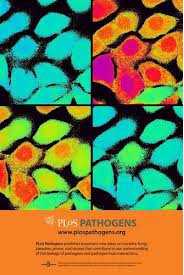PLoS Pathog:MiniCD4凝胶或可有效抵御HIV的感染和传播
2013-07-27 T.Shen 生物谷
刊登在国际杂志PLOS Pathogens上的一篇研究报告中,来自欧洲联合高效抗逆转录病毒杀微生物剂协会的研究者通过对非灵长类动物模型进行研究揭示,一种杀微生物剂的凝胶可以有效抵御AIDS病毒的感染。研究者描述了这种凝胶的关键成分是一种小分子的多肽,其可以作为诱饵来与病毒结合,并且抑制艾滋病毒感染机体细胞。 目前在世界范围内,科学家都在致力于开发出新型的抵御HIV感染的疫苗,与此同时,很多研究者
刊登在国际杂志PLOS Pathogens上的一篇研究报告中,来自欧洲联合高效抗逆转录病毒杀微生物剂协会的研究者通过对非灵长类动物模型进行研究揭示,一种杀微生物剂的凝胶可以有效抵御AIDS病毒的感染。研究者描述了这种凝胶的关键成分是一种小分子的多肽,其可以作为诱饵来与病毒结合,并且抑制艾滋病毒感染机体细胞。
目前在世界范围内,科学家都在致力于开发出新型的抵御HIV感染的疫苗,与此同时,很多研究者也在研究用杀微生物剂的凝胶来降低HIV的传播和感染。截止目前,一些抵御病毒进入机体细胞的疗法表现出潜在的个体保护作用。
本文研究中,研究者使用了名为“miniCD4s”的工程化肽类,因为其可以模仿CD4细胞的受体来使用,CD4受体是HIV细胞进入机体免疫细胞的通道。研究揭示了miniCD4s可以阻止HIV病毒进入到动物模型的离体细胞中。研究者在杀微生物剂的凝胶中添加入0.3%的miniCD4s,并且将其植入到6只雌性短尾猴的阴道中,随后研究者给短尾猴的阴道中注入高剂量的HIV病毒,这个剂量足以使得短尾猴感染,但是结果显示,6只短尾猴中有5只都没有被HIV感染,而且在机体组织中也没有发现HIV感染的踪迹。也不能在其血浆中检测出任何病毒的抗体,这就揭示了,这种杀微生物剂的凝胶(含miniCD4s)的确可以抑制HIV的感染。
这项研究为我们开发抑制HIV,保护个体的疗法提供了帮助和希望,后期研究者将会进行临床上的试验进一步揭示其研究成果。

doi:10.1371/journal.ppat.1003071
PMC:
PMID:
MiniCD4 Microbicide Prevents HIV Infection of Human Mucosal Explants and Vaginal Transmission of SHIV162P3 in Cynomolgus Macaques
Nathalie Dereuddre-Bosquet1,2, Laurence Morellato-Castillo3, Joachim Brouwers4, Patrick Augustijns4, Kawthar Bouchemal5, Gilles Ponchel5, Oscar H. P. Ramos3, Carolina Herrera6, Martha Stefanidou7, Robin Shattock6, Leo Heyndrickx8, Guido Vanham8, Pascal Kessler3, Roger Le Grand1,2, Loïc Martin3*
In complement to an effective vaccine, development of potent anti-HIV microbicides remains an important priority. We have previously shown that the miniCD4 M48U1, a functional mimetic of sCD4 presented on a 27 amino-acid stable scaffold, inhibits a broad range of HIV-1 isolates at sub-nanomolar concentrations in cellular models. Here, we report that M48U1 inhibits efficiently HIV-1Ba-L in human mucosal explants of cervical and colorectal tissues. In vivo efficacy of M48U1 was evaluated in nonhuman primate (NHP) model of mucosal challenge with SHIV162P3 after assessing pharmacokinetics and pharmacodynamics of a miniCD4 gel formulation in sexually matured female cynomolgus macaques. Among 12 females, half were treated with hydroxyethylcellulose-based gel (control), the other half received the same gel containing 3 mg/g of M48U1, one hour before vaginal route challenge with 10 AID50 of SHIV162P3. All control animals were infected with a peak plasma viral load of 105–106 viral RNA (vRNA) copies per mL. In animals treated with miniCD4, 5 out of 6 were fully protected from acquisition of infection, as assessed by qRT-PCR for vRNA detection in plasma, qPCR for viral DNA detection in PBMC and lymph node cells. The only infected animal in this group had a delayed peak of viremia of one week. These results demonstrate that M48U1 miniCD4 acts in vivo as a potent entry inhibitor, which may be considered in microbicide developments.
(责任编辑:yan.mao)
本网站所有内容来源注明为“梅斯医学”或“MedSci原创”的文字、图片和音视频资料,版权均属于梅斯医学所有。非经授权,任何媒体、网站或个人不得转载,授权转载时须注明来源为“梅斯医学”。其它来源的文章系转载文章,或“梅斯号”自媒体发布的文章,仅系出于传递更多信息之目的,本站仅负责审核内容合规,其内容不代表本站立场,本站不负责内容的准确性和版权。如果存在侵权、或不希望被转载的媒体或个人可与我们联系,我们将立即进行删除处理。
在此留言










#CD4#
73
#ICD#
56
#凝胶#
70